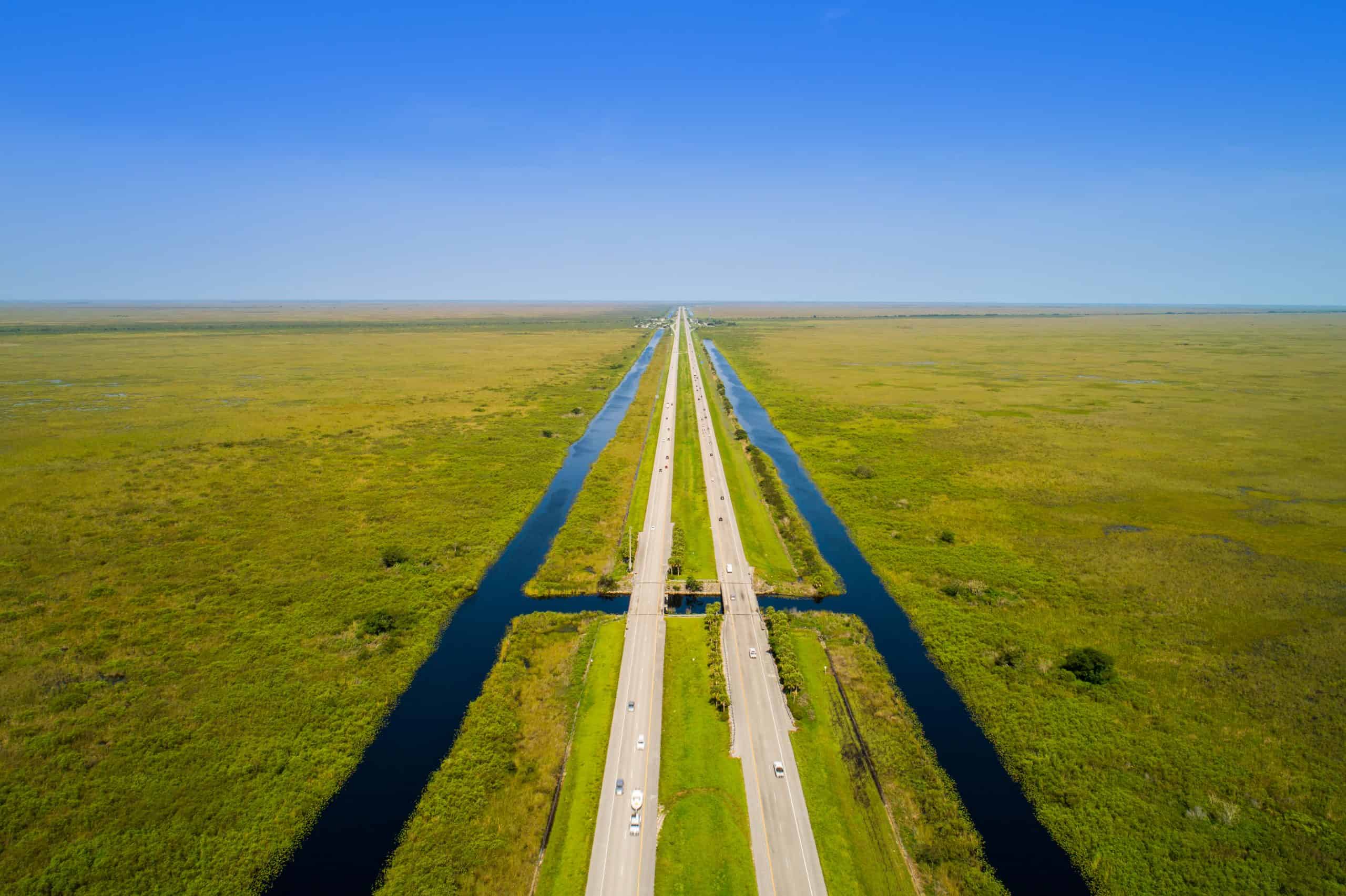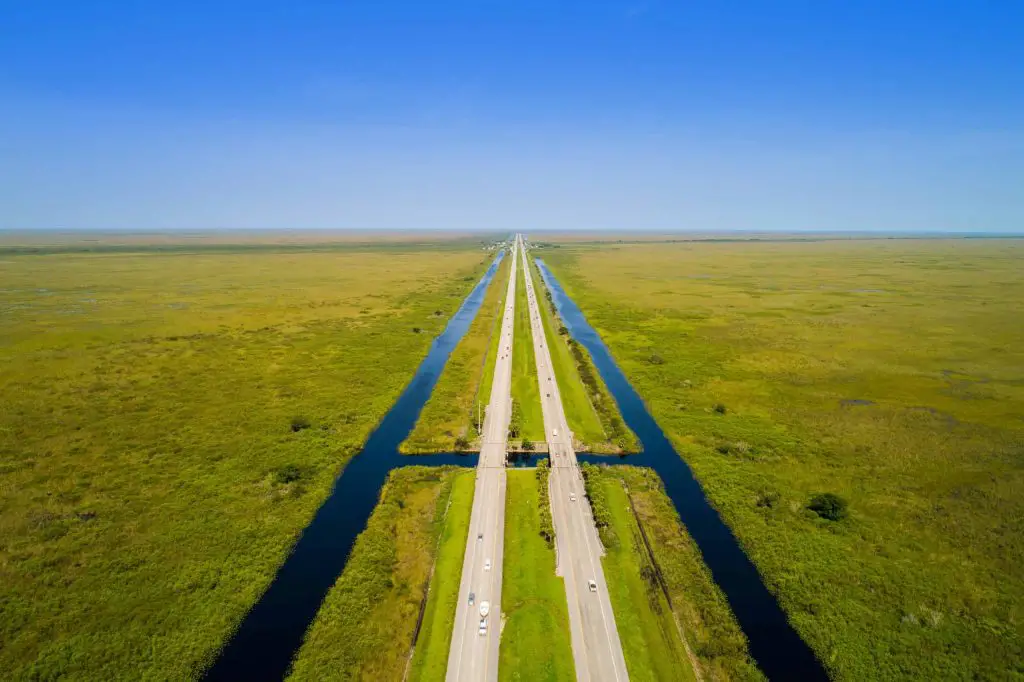Alligator Alley is a 78-mile stretch of road that runs through the heart of the Florida Everglades. It is a scenic route that attracts tourists and locals alike, but its name may have you wondering: what road is Alligator Alley?
The answer is simple: Alligator Alley is the portion of Interstate 75 that runs between Naples and Fort Lauderdale. But don’t let its name fool you – while alligators may be present in the surrounding marshes, the road itself is safe and well-maintained, offering a unique driving experience through one of Florida’s most stunning natural wonders.
Alligator Alley is a highway in Florida that runs from Naples on the west coast to Fort Lauderdale on the east coast. The official name of the road is the “Everglades Parkway,” but it is more commonly known as Alligator Alley. The road is a popular route for tourists and locals alike, offering beautiful views of the Everglades and the surrounding wildlife.

What Road is Alligator Alley?
Alligator Alley is a road that stretches across southern Florida, running from Naples on the Gulf of Mexico to Fort Lauderdale on the Atlantic Ocean. The official name of the road is the Everglades Parkway, but most people refer to it as Alligator Alley due to the abundance of alligators that can be seen in the nearby Everglades.
History of Alligator Alley
The idea for Alligator Alley was first proposed in the 1920s, but it wasn’t until the 1960s that construction began. The road was built in order to provide a faster and more direct route for motorists traveling between the east and west coasts of Florida. Prior to the construction of Alligator Alley, drivers had to take a much longer and more circuitous route through the heart of the state.
The Benefits of Alligator Alley
One of the main benefits of Alligator Alley is that it saves drivers a significant amount of time. The road is a straight shot across southern Florida, which means that drivers can get from Naples to Fort Lauderdale in just a few hours. This is a big improvement over the old route, which could take an entire day or more.
Another benefit of Alligator Alley is that it provides drivers with a unique and scenic drive through the heart of the Everglades. The road is surrounded by water, marshes, and swamps, which means that drivers are likely to see a wide variety of wildlife, including alligators, turtles, and birds.
Alligator Alley vs. Other Florida Roads
Compared to other roads in Florida, Alligator Alley is relatively safe. The road is well-maintained and has a low accident rate. However, drivers should still exercise caution when driving on the road, especially during the rainy season when the road can become slippery and flooded.
One of the main drawbacks of Alligator Alley is that it is a toll road. Drivers must pay a toll in order to use the road, which can be a significant expense for frequent travelers. However, the tolls are used to help fund maintenance and improvements to the road, which means that drivers can expect a high level of service.
Alligator Alley in the Future
In the future, Alligator Alley is likely to see continued growth and development. The road is an important transportation corridor for southern Florida, and there are plans to improve and expand it in the coming years. This could include widening the road, adding new lanes, and improving interchanges and exits.
Overall, Alligator Alley is an important and unique part of southern Florida’s transportation network. Despite its name, the road is safe and well-maintained, and provides drivers with a scenic and efficient route across the state.
Frequently Asked Questions
Here are some commonly asked questions about Alligator Alley:
What is Alligator Alley?
Alligator Alley is a stretch of highway that runs across the southern part of Florida, connecting Naples on the west coast to Fort Lauderdale on the east coast. It is also known as State Road 84 or Everglades Parkway. The road got its name because it passes through the Everglades, which is home to a large population of alligators.
Today, Alligator Alley is a major transportation route for commuters and tourists alike, providing easy access to popular destinations such as the beaches of Fort Lauderdale and the Everglades National Park.
How long is Alligator Alley?
Alligator Alley is approximately 80 miles long, running east to west across southern Florida. It begins in Naples at the intersection of Collier Boulevard and Tamiami Trail (US 41) and ends in Fort Lauderdale at the intersection of I-75 and US 27.
The highway is a four-lane divided roadway with a speed limit of 70 mph, making it a quick and convenient way to travel across the state.
Is Alligator Alley a toll road?
Yes, Alligator Alley is a toll road. As of 2021, the toll for a standard vehicle is $3.00 one way. Toll booths are located at both ends of the highway, and electronic tolling is also available with a SunPass transponder. Motorcycles and other types of vehicles may have different toll rates.
The toll revenue is used to maintain and improve the highway, ensuring a safe and comfortable driving experience for all travelers.
What are some attractions near Alligator Alley?
There are several popular attractions located near Alligator Alley. One of the most famous is the Everglades National Park, which is home to a unique ecosystem of wetlands, mangroves, and wildlife. Another popular destination is the Seminole Casino Hotel in Immokalee, which offers gaming, dining, and entertainment.
Other nearby attractions include the Gulf beaches of Naples and Marco Island, the Sawgrass Mills Outlet Mall in Sunrise, and the BB&T Center in Sunrise, which is home to the Florida Panthers NHL team.
Is it safe to drive on Alligator Alley?
Yes, Alligator Alley is a safe and well-maintained highway. However, as with any road, it is important to take precautions while driving. The highway passes through the Everglades, which means there may be wildlife crossing the road at any time. Drivers should be alert and aware of their surroundings, especially at night.
In addition, it is important to obey the posted speed limit and to avoid distracted driving. By following these guidelines, travelers can enjoy a safe and comfortable journey on Alligator Alley.
Explore Alligator Alley In South Florida
In conclusion, Alligator Alley is a road that stretches across the state of Florida, connecting the east and west coasts. It is a popular route for tourists and locals alike, offering stunning views of the Everglades and plenty of opportunities for wildlife sightings.
Despite its name, the road is not overrun with alligators. However, it is important to exercise caution while driving, as these creatures do occasionally cross the road.
Overall, Alligator Alley is a unique and exciting way to explore Florida’s natural beauty and connect with its diverse wildlife. So next time you’re planning a road trip, be sure to add this scenic route to your itinerary!

